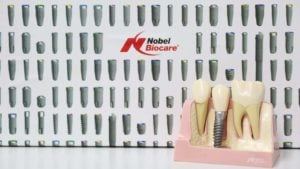
Halloween has come and gone for another year.
Candy by the bag load was collected, sorted by parents and eaten by children and adults alike. According to data from Entrepreneur, chocolate is the favorite sweet for Americans by a 2:1 margin.
However, candies such as gummies and marshmallows are gaining ground, while candy corn has seen sales drop yearly since 2018.
“‘Either people love it or hate it,’ Beth Kimmerle, founder of found industry data company Attribute Analytics told CNN. She says the marshmallowy vanilla taste has not aged well,” Entrepreneur reported on Oct. 31.
What’s the most popular Halloween candy? A Monmouth University survey says it’s the Reese’s Peanut Butter Cup, twice as popular as a Snickers bar, the second favorite Halloween candy of Americans.
Post-Halloween, the stocks to bet on might not be the candy companies. Instead, it could be all the firms delivering products and services to keep your teeth and gums healthy.
Here are three that should be on the top of your watch list.
Envista Holdings (NVST)

Envista Holdings (NYSE:NVST) is the former dental subsidiary of Danaher (NYSE:DHR). It was spun off in September 2019. It sold 26.8 million shares at $22. It used the proceeds plus $1.3 billion in term debt to pay Danaher for the business. Danaher owned 80.6% of the company after the IPO.
Three months later, Danaher distributed the remaining shares it held in Envista to its shareholders through an exchange offer. For every $100 of Danaher stock held, shareholders who elected to exchange shares received $107.53 in Envista, up to a maximum of 5.5784 shares. Ultimately, if you selected the exchange offer, you got 5.5784 NVST shares for one DHR share.
The exchange offer was completed on Dec. 13, 2019. DHR shares are up 46% in the nearly four years since. Envista shares are down 22% over the same period. However, from the March 2020 lows, it’s doubled in value, so there is some good news.
The business comprises two operating segments: Specialty Products & Technologies, including implants and orthodontic solutions, and Equipment & Consumables, consisting of imaging & diagnostic solutions and Everyday Dental businesses.
Danaher built the business through more than 25 acquisitions over 15 years. Today, it has more than 30 brands sold in more than 120 countries.
Most dental-related businesses are struggling at the moment. Envista is no different. In Q3 2023, its sales were flat from last year at $631.3 million. However, due to reasonable expense control, its operating income increased 11.8% to $83.3 million and a healthy 23% operating margin.
It trades at 1.51x sales, suggesting its valuation is lower than it’s been since becoming a public company in the fall of 2019.
Align Technology (ALIGN)

Align Technology (NASDAQ:ALGN) was founded in 1997 with a single focus on leveraging technology to straighten teeth. It created the Invisalign System two years later, and it hasn’t looked back, helping orthodontists and dentists treat 15.7 million patients with Invisalign.
The company’s shares have gone through a boom-and-bust over the past four years, trading as low as $145 in March 2020, then as high as $725 in September 2021, falling back to the $100s in November 2022, back up to $413 in July, and now back below $200.
Where will it go next?
The company reported Q3 2023 results in late October. Sales were up 7.8%, to $960.2 million, while its adjusted net income rose 29.2%, to $164.3 million. Approximately 83% of its revenue is from clear aligners, and the remaining 17% is from the sale of iTero intraoral scanners and exocad CAD/CAM software for digital orthodontics and restorative dentistry.
“Dental practices and industry research firms have reported deteriorating trends, including decreased patient visits and increased patient appointment cancellations, along with fewer orthodontic case starts overall, especially among adult patients,” CEO Joe Hogan stated in Align’s press release.
Well, there you have it, a confirmation from an industry player that business has slowed.
I wouldn’t be too concerned. Of the 16 analysts covering ALGN stock, 12 rate it Overweight or an outright Buy, with a $290 target price, 46% higher than where it’s currently trading.
Below $200, it’s a buy.
Patterson Companies (PDCO)

Patterson Companies (NASDAQ:PDCO) began life as a distributor of dental supplies in 1877. It went public in 1992 and remained exclusively dental until July 2001, when it acquired J.A. Webster Inc., a veterinary supply business. Two years later, it purchased AbilityOne Products Corp., a rehabilitation supply business.
It changed its name from Patterson Dental Company to Patterson Companies in 2004 to reflect these changes. In 2015, the company sold its medical segment, so it only had two today.
In Q1 2024, its Dental business accounted for 36% of its $1.58 billion in revenue, while Animal Health accounted for 64%. The dental segment is the more profitable of the two.
Over the past 20 years, PDCO stock has traded between $20 and $50. On three occasions, it sold at the low end of this range — May 2003, March 2009 and March 2020 — and on two occasions — April 2005 and February 2015 — it traded at the high end.
Currently trading below the halfway point of its 20-year range ($35), Patterson’s 3.3% dividend yield will pay you to wait for it to move to the high end of this range.
You’re not going to get rich from its stock, but it’s a leading distributor of products in two markets (dental and animal health) that aren’t going to see demand fall off a cliff.
If its shares fall to $20, you’ll want to back up the truck.
On the date of publication, Will Ashworth did not hold (either directly or indirectly) any positions in the securities mentioned in this article. The opinions expressed in this article are those of the writer, subject to the InvestorPlace.com Publishing Guidelines.






